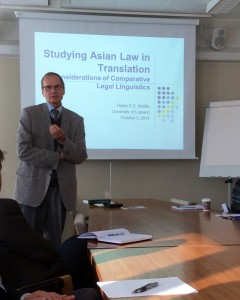On Thursday, 2 October 2014, the Center had the pleasure to host, in the framework of its Guest Lecture Series, a pioneer of Comparative Legal Linguistic in Finland – Professor Heikki E.S Mattila.

Professor Mattila gave a very comprehensive lecture in which he raised a range of general challenges that scholars face in studying foreign laws, and especially when doing so through the use of translations. He underlined that it is important to ask what kind of background knowledge – in relation to both comparative law and legal linguistics – researchers need to have when studying foreign law.
He started therefore by giving an historical background of the globalization of European legal traditions and languages, with a special focus on Asia. Based on the intensification of socio-economic relations and the growing importance of Asian countries, he also discussed the future of Asian law and Asian legal languages. Chinese and other Asian legal languages may or may not become transnational legal lingua francas, yet it is certain that European lawyers will encounter these languages increasingly. Hence, he identified the sources of misunderstanding, such as the use of link- and ‘zigzag’ translations, and underlined that the solution lies in the awareness of the challenges and in a broad understanding of the foreign culture. Professor Mattilla drew upon his extensive experience in comparative legal studies to present these developments using case studies of India, Indonesia and China.
Following this insightful lecture, the audience, which included Western and Chinese scholars, engaged into a lively discussion. Topics covered issues such as the romanization of Chinese for study purposes, the return to traditional Chinese in legal work in China, the uncertainty of English, Chinese and Finnish as legal languages, the emergence of new types of English like ‘European English’ and ‘Global English’, and the core place that culture occupies in comparative legal linguistic. All these factors create the challenges that one needs to be aware of when studying Chinese Law.
